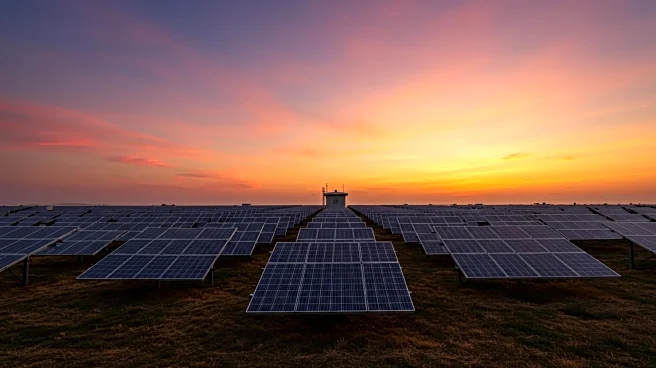What's Happening?
India is intensifying its efforts to achieve energy self-reliance by expanding its energy infrastructure, as announced by Petroleum and Natural Gas Minister Hardeep Singh Puri. The country, which is the third-largest energy consumer globally, is focusing on securing energy resources domestically. Since 2015, India has made 172 oil and gas discoveries, including 62 in offshore areas, which are pivotal in its quest for energy security. The Oil and Natural Gas Corporation (ONGC) and Oil India Ltd. have embarked on an ambitious exploration campaign in the Andaman ultra-deepwater region, targeting depths of up to 5,000 meters. This initiative has led to the discovery of an active thermogenic petroleum system, comparable to those in Myanmar and North Sumatra. The campaign has validated the presence of a working petroleum system, laying the groundwork for further exploration. Additionally, India has achieved nearly 20% ethanol blending with petrol, significantly reducing foreign exchange expenditure and CO2 emissions.
Why It's Important?
India's push towards energy self-reliance is crucial in the context of global energy market volatility and geopolitical tensions affecting oil prices. By enhancing its domestic energy production capabilities, India aims to reduce its dependency on imports, thereby stabilizing its economy against external shocks. The expansion of energy infrastructure not only supports economic growth but also aligns with environmental goals by reducing carbon emissions through increased ethanol blending. This move is expected to benefit various stakeholders, including farmers, who gain from higher sugarcane prices due to ethanol production. The initiative also positions India as a significant player in the global energy landscape, potentially influencing energy policies and market dynamics.
What's Next?
India's continued investment in energy exploration and infrastructure development is likely to attract further global interest and partnerships, particularly in the Andaman region. The government may introduce additional policies to support renewable energy integration and further reduce carbon emissions. Stakeholders, including international energy companies and environmental groups, will closely monitor India's progress and its impact on global energy markets. The success of these initiatives could lead to increased energy security and economic resilience for India, setting a precedent for other nations seeking energy independence.
Beyond the Headlines
The expansion of India's energy infrastructure raises questions about the environmental impact of deepwater drilling and the balance between energy development and ecological preservation. The government's approach to managing these challenges will be critical in maintaining public support and ensuring sustainable growth. Additionally, the geopolitical implications of India's energy self-reliance could shift regional power dynamics, particularly in relation to energy-exporting countries.











